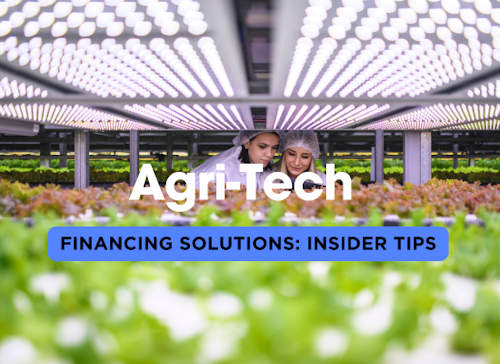The agriculture industry is undergoing a revolution, with technology playing a pivotal role in transforming traditional farming practices. From precision agriculture to autonomous machinery, smart farming technologies are helping farmers increase efficiency, reduce costs, and optimize yields. However, integrating these advanced technologies requires substantial investment, and that’s where Agri-Tech loans come into play. These specialized loans are designed to support farmers and agri-businesses in adopting innovative technologies, ensuring they stay competitive in an increasingly tech-driven world. In this article, we’ll explore the key aspects of Agri-Tech loans, including types of loans available, benefits, challenges, and insider tips to secure the best financing for your smart farming venture.
Hint: Make it to the end for insider tips!
| IncBook: Agri-Tech Loan Type | Benefits | Challenges | Best for | Interest Rates | Typical Loan Amounts |
|---|---|---|---|---|---|
| Precision Agriculture Loan | Enables purchase of advanced equipment for precision farming, leading to higher yields and reduced waste. | High upfront cost; requires technical expertise to maximize benefits. | Large-scale farms looking to optimize production. | 3.5% – 7.5% | $100,000 – $2,000,000 |
| Autonomous Machinery Financing | Reduces labor costs and increases efficiency with autonomous tractors, drones, and harvesters. | High maintenance costs; technology still evolving. | Farms aiming to reduce dependency on labor and increase automation. | 4.0% – 8.0% | $250,000 – $3,000,000 |
| Renewable Energy for Farms Loan | Supports installation of solar panels, wind turbines, or biogas plants to reduce energy costs. | Long ROI period; initial setup can be complex. | Farms in remote areas or those with high energy costs. | 2.5% – 6.5% | $50,000 – $1,500,000 |
| IoT and Data Analytics Loan | Funds the integration of IoT devices and data analytics platforms to monitor and manage farm operations. | Requires continuous data management; potential cybersecurity risks. | Tech-savvy farms focused on data-driven decision-making. | 3.0% – 7.0% | $75,000 – $1,000,000 |
| Vertical Farming Loan | Enables urban farms to grow crops vertically, maximizing space and efficiency. | High energy consumption; limited to certain crop types. | Urban agriculture projects and small-scale indoor farms. | 3.5% – 7.5% | $100,000 – $2,500,000 |
| Agri-Drones and UAVs Loan | Facilitates the purchase of drones for crop monitoring, spraying, and surveillance. | Requires skilled operators; regulations may vary by region. | Farms in large, diverse terrains where traditional monitoring is challenging. | 4.0% – 8.5% | $50,000 – $500,000 |
| Soil Health and Irrigation Systems Loan | Finances the upgrade to advanced irrigation and soil monitoring systems, promoting sustainable water use. | Initial setup can be costly; ROI dependent on water savings and crop yield. | Farms in arid regions or those looking to improve water efficiency. | 3.0% – 6.0% | $100,000 – $1,000,000 |
| Genetically Modified Seeds Loan | Supports the purchase of high-yield, pest-resistant genetically modified seeds. | Controversial in some markets; long-term environmental impact debates. | Commercial farms focused on maximizing crop yield. | 3.5% – 7.0% | $50,000 – $500,000 |
| Aquaponics and Hydroponics Loan | Funds innovative water-based farming methods for year-round crop production. | Requires specialized knowledge and systems; energy-intensive. | Farms in urban areas or those looking to diversify into new growing methods. | 3.5% – 7.5% | $75,000 – $1,500,000 |
| Agri-Biotechnology Loan | Finances research and development in agricultural biotechnology, including crop genetic engineering and biopesticides. | High research costs; long development timelines. | Research institutions and large-scale farms investing in innovation. | 5.0% – 9.0% | $200,000 – $5,000,000 |
| Sustainable Packaging Loan | Supports the development and implementation of eco-friendly packaging solutions for agricultural products. | Can be more expensive than traditional packaging; requires consumer demand. | Agri-businesses looking to appeal to environmentally conscious consumers. | 4.0% – 7.0% | $50,000 – $1,000,000 |
Insider Tips for Securing the Best Agri-Tech Loans
When it comes to financing smart farming initiatives, simply applying for a loan isn’t enough. To truly maximize your chances of securing the best terms and making the most of your investment, you need to approach the process strategically.
1. Leverage Agri-Tech Grants and Subsidies
- Tip: Before applying for a loan, research and apply for any available grants or subsidies specific to agri-tech. Governments and international organizations often provide funding to support innovation in agriculture. Combining grants with loans can reduce your financial burden and improve your loan terms.
- Why It’s Cool: You can sometimes use grant approvals as leverage when negotiating loan terms, showing lenders that you have external backing.
2. Engage in Collaborative Buying
- Tip: Consider joining or forming a cooperative with other local farmers or agri-businesses to purchase technology in bulk. Banks are often more willing to offer favorable loan terms when the loan is part of a larger, collaborative effort.
- Why It’s Cool: By pooling resources, you not only lower the individual cost but also increase your bargaining power with lenders and suppliers.
3. Incorporate Agri-Tech Startups into Your Plan
- Tip: Partner with agri-tech startups that are looking for pilot projects to showcase their technology. They might offer discounts or even co-financing options, which can be included in your loan application.
- Why It’s Cool: This collaboration not only reduces your initial outlay but also gives you access to cutting-edge technology that can set your farm apart from competitors.
4. Secure Interest Rate Reductions with Environmental Impact Reports
- Tip: Work with environmental consultants to create a detailed impact report showing how your tech investment will lead to sustainable farming practices. Many lenders offer interest rate reductions for loans tied to environmentally friendly projects.
- Why It’s Cool: Banks are increasingly looking to support green initiatives, and a solid environmental impact report can help you negotiate better terms.
5. Use Agri-Tech as Collateral
- Tip: Some advanced farming equipment can be used as collateral for your loan. If you’re investing in high-value machinery like autonomous tractors or precision irrigation systems, discuss the possibility of securing a loan using the equipment itself as collateral.
- Why It’s Cool: This approach can reduce the need for additional collateral, making it easier to secure financing without putting other assets at risk.
6. Tap Into Local Agri-Tech Incubators and Accelerators
- Tip: Get involved with local agri-tech incubators or accelerators. Not only can they provide mentorship and networking opportunities, but they also often have partnerships with financial institutions, which can lead to more favorable loan terms.
- Why It’s Cool: Being part of an incubator or accelerator gives you access to a support system and resources that can make your loan application more attractive to lenders.
7. Customize Your Loan with Performance-Based Repayment Plans
- Tip: Negotiate a performance-based repayment plan where your loan repayments are tied to the success of your agri-tech implementation (e.g., increased crop yields or reduced operational costs). This can be particularly useful if you’re adopting unproven technology.
- Why It’s Cool: This type of repayment plan aligns your financial obligations with your operational success, reducing pressure during the initial phase of technology adoption.
8. Maximize Tax Benefits by Timing Your Loan
- Tip: Time your loan disbursement to coincide with tax benefits such as depreciation or investment tax credits. Consult with a tax advisor to structure your loan and equipment purchase in a way that maximizes your tax savings.
- Why It’s Cool: This strategy allows you to offset a portion of your loan interest with tax savings, effectively reducing the cost of borrowing.
9. Pilot New Technologies Through Lease-to-Own Programs
- Tip: Before fully committing to a large loan, consider lease-to-own programs for new agri-tech equipment. This allows you to test the technology’s effectiveness on your farm while keeping the option to purchase it later with a loan.
- Why It’s Cool: Lease-to-own programs give you flexibility and reduce risk, as you can ensure the technology meets your needs before securing a long-term loan.
10. Negotiate Supplier Partnerships for Extended Warranty and Maintenance
- Tip: When taking out a loan for agri-tech equipment, negotiate with suppliers to include extended warranties and maintenance contracts. Lenders view well-maintained equipment as less risky, which can lead to better loan terms.
- Why It’s Cool: This not only enhances the longevity of your investment but also provides peace of mind, knowing that any technical issues won’t derail your operations or financial plans.
Reference Links
USDA Farm Service Agency – Farm Loan Programs
- URL: https://www.fsa.usda.gov/programs-and-services/farm-loan-programs/index
- Description: The USDA’s Farm Service Agency offers a range of loan programs designed to help farmers finance their operations, including those focused on adopting new technologies. This site provides details on various loan options, eligibility criteria, and application processes specifically tailored to agricultural businesses.
National Institute of Food and Agriculture (NIFA) – Agriculture and Food Research Initiative (AFRI)
- URL: https://nifa.usda.gov/program/agriculture-and-food-research-initiative-afri
- Description: NIFA’s AFRI program funds research, education, and extension projects that address key challenges in agriculture, including the development and implementation of advanced agricultural technologies. This resource is particularly useful for farmers and agri-businesses interested in the latest innovations and potential funding opportunities.
European Innovation Partnership ‘Agricultural Productivity and Sustainability’ (EIP-AGRI)
- URL: https://ec.europa.eu/eip/agriculture/en
- Description: EIP-AGRI focuses on promoting innovation in agriculture across Europe, including the adoption of smart farming technologies. The website offers insights into EU-funded projects, best practices, and opportunities for collaboration among farmers, researchers, and agri-tech companies.
Sustainable Agriculture Research & Education (SARE)
- URL: https://www.sare.org
- Description: SARE provides grants and resources to promote sustainable farming practices in the United States. Their website offers extensive information on grants and funding opportunities for farmers interested in sustainable and smart farming technologies.
FAO – Agricultural Innovation
- URL: https://www.fao.org/innovation/en/
- Description: The Food and Agriculture Organization (FAO) of the United Nations focuses on innovation in agriculture, including the promotion of smart farming practices. This resource is valuable for accessing global perspectives, case studies, and guidelines on implementing innovative agricultural technologies.



